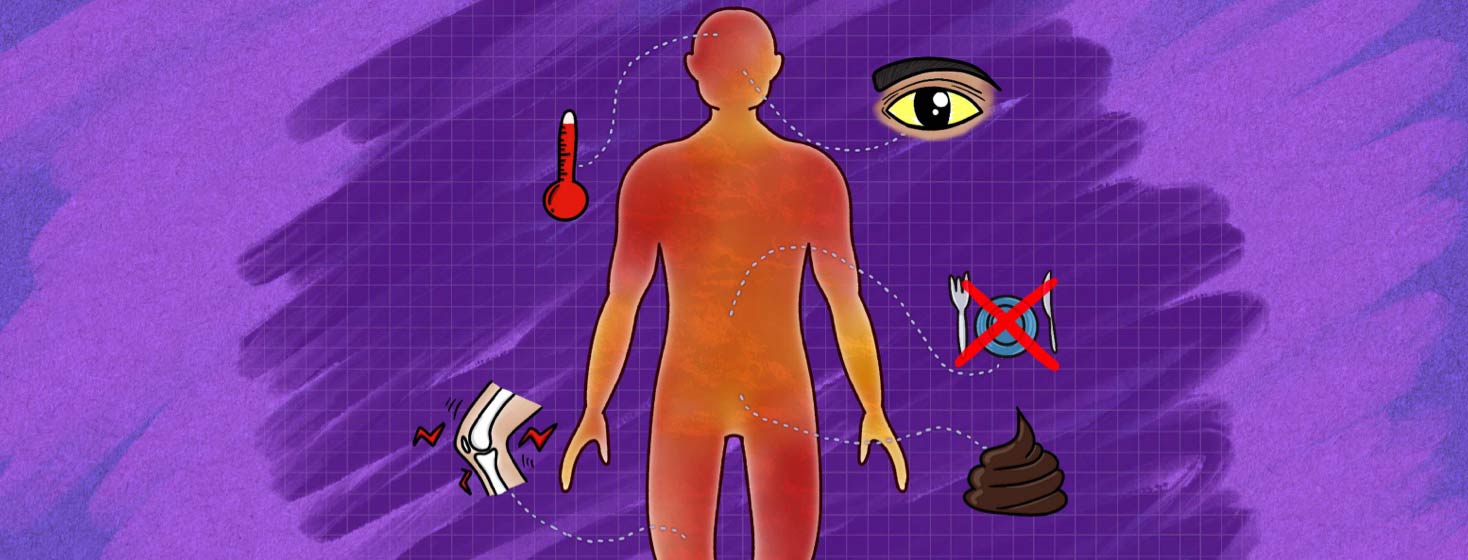What Are The Symptoms of Hep C?
One of the challenging features of hepatitis C is that many of those who have hep C are not aware that they have it. This is primarily because there are often no discernible symptoms. Only 1 in 3 or 4 people show symptoms in the first 6 months of their infection.1
Acute versus chronic hepatitis C
Hepatitis C has two primary phases: acute and chronic. The initial, acute phase doesn't always develop into a chronic condition; Some of those infected will not have symptoms and the HCV will be cleared from their bodies without treatment, a phenomenon known as spontaneous viral clearance, which occurs in 15-25% of the acute cases.2
For those whose bodies don't clear the virus and do have early symptoms in their acute state, these will usually present as in a variety of visual and physical manifestations including jaundice (a yellow discoloration of eyes and skin in about 1 in 5 people), fatigue, nausea, fever (100.4 F or above), loss of appetite, abdominal aches, and muscle aches. When manifested, these symptoms usually occur two to three months after exposure and last from two weeks to three months.
Late symptoms of hep C
When not spontaneously cleared, the virus eventually develops into a chronic condition and if they didn't in the acute phase, what are termed "late" symptoms may appear. This is also very variable; With some chronic patients symptoms are barely noticeable, while in others, the symptoms significantly impact their lives. As in the acute stage, the chronic symptoms may not occur and those infected may not be aware that it's is related to hepatitis infection. The symptoms aligned with the chronic state can also be periodic, thus they can appear and disappear over time. Some of the common symptoms include chronic fatigue, joint and muscle aches, declines in short-term memory, concentration and trouble doing complex mental tasks (often termed "brain fog"), mood swings, depression and anxiety, indigestion or bloating, and abdominal pain.
While chronic fatigue may be a symptom of hep C, it is a symptom for many illnesses. Unless one is in a high-risk category, its easy to think the hep C symptoms might instead be symptoms of the flu, depression, or other triggers.
Signs of worsening hep C or liver disease
When chronic hep C remains untreated, it can cause liver scarring (cirrhosis), liver cancer, or failure. The symptoms of cirrhosis include jaundice, weight loss, itchy skin, vomiting of blood, darkened urine or bowel movements, confusion, drowsiness and slurred speech (hepatic encephalopathy), and build-up of fluid in the legs or abdomen.2
Options for testing
When any of the signs appear, it may be a good time to get tested using one of two blood tests, the antibody test or the PCR test. The antibody blood test determines whether you have ever been exposed to the hepatitis C virus by testing for the presence of antibodies to the virus. Antibodies are produced by your immune system to fight outside invaders.1 On the other hand, the PCR blood test identifies if the virus is present in your body by documenting its reproduction. If one has a positive PCR test, the spontaneous viral clearance did not occur and the infection has progressed to a long-term (chronic) stage.

Join the conversation